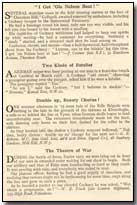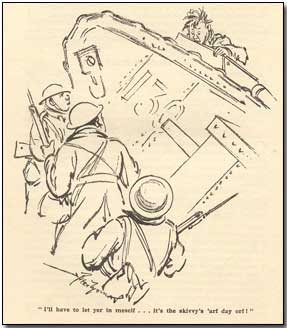Memoirs & Diaries - The Best 500 Cockney War Stories - "I Got 'Ole Nelson Beat!" and Other Stories
 Published in London
in 1921, The Best 500 Cockney War Stories
comprised, in the words of its newspaper publisher (The London Evening
News) "a remembering and retelling of those war days when laughter
sometimes saved men's reason".
Published in London
in 1921, The Best 500 Cockney War Stories
comprised, in the words of its newspaper publisher (The London Evening
News) "a remembering and retelling of those war days when laughter
sometimes saved men's reason".
The collection of short memoirs, some 500 in total, is divided into five categories - Action, Lull, Hospital, High Seas and Here and There. This page contains five stories from Action, led by "I Got 'Ole Nelson Beat!".
Other sections within the collection can be accessed using the sidebar to the right.
"I Got 'Ole Nelson Beat!"
Several stretcher cases in the field dressing station at the foot of "Chocolate Hill," Gallipoli, awaited removal by ambulance, including a Cockney trooper in the dismounted Yeomanry.
He had a bandage round his head, only one eye was visible, and his left arm was bound to his breast with a sandbag.
His rapid-fire of Cockney witticisms had helped to keep our spirits up while waiting - he had a comment for everything.
Suddenly a "strafe" started, and a shrapnel shell shot its load among us.
Confusion, shouts, and moans - then a half-hysterical, half-triumphant shout from the Cockney: "Lumme, one in the blinkin' leg this time. I got 'ole Nelson beat at last!"
J. Coomer (late R.E.), 31 Hawthorn Avenue, Thornton Heath
Two Kinds of Fatalist
A German sniper was busy potting at our men in a front-line trench at Cambrai in March 1918.
A Cockney "old sweat," observing a youngster gazing over the parapet, asked him if he were a fatalist.
The youngster replied "Yes."
"So am I," said the Cockney, "but I believes in duckin'."
"Brownie," Kensal Rise, N.W.10
Double Up, Beauty Chorus!
One summer afternoon in '15 some lads of the Rifle Brigade were bathing in the lake in the grounds of the chateau at Elverdinghe, a mile or so behind the line at Ypres, when German shells began to land uncomfortably near.
The swimmers immediately made for the land, and, drawing only boots on their feet, dashed for the cellar in the chateau.
As they hurried into the shelter a Cockney sergeant bellowed, "Nah then, booty chorus: double up an' change for the next act!"
G.E. Roberts, M.C. (late Genl. List, att'd 21st Divn. Signal Co.), 28 Sunbury Gardens, Mill Hill, N.W.7
The Theatre of War
During the battle of Arras, Easter 1917, we were lying out in front of our wire in extended order waiting for our show to begin. Both our artillery and that of Fritz were bombarding as hard as they could.
It was pouring with rain, and everybody was caked in mud.
Our platoon officer, finding he had a good supply of chocolate, and realising that rations might not be forthcoming for some time, crept along the line and gave us each a piece.
As he handed a packet to one cheerful Cockney he was asked, "Wot abaht a programme, sir?"
W.B. Finch (late London Regiment), 155 High Road, Felixstowe
"It's the Skivvy's 'Arf Day Orf"
Easter Monday, April 9, 1917. Night. Inches of snow and a weird silence everywhere after the turmoil of the day.
Our battalion is held up in front of Monchy-le-Preux during the battle of Arras. I am sent out with a patrol to reconnoitre one of our tanks that is crippled and astride the German wire 300 yards out.
It is ticklish work, because the crew may be dead or wounded and Fritz in occupation.
Very warily we creep around the battered monster and presently I tap gingerly on one of the doors. No response. We crawl to the other side and repeat the tapping process. At last, through the eerie silence, comes a low, hoarse challenge.
"Oo are yer?"
"Fusiliers!" I reply, as I look up and see a tousled head sticking through a hole in the roof.
"Ho!" exclaims the voice above, "I'll 'ave ter come dahn and let yer in meself, it's the skivvy's 'arf day orf!"
The speaker proved to have a shattered arm - among other things - and was the sole survivor of the crew.
D.K., Fulham, S.W.6.
Next - Cricket on the Somme and four other stories
One in five of the Australians and New Zealanders who left their country to fight in the war never returned; 80,000 in total.
- Did you know?

